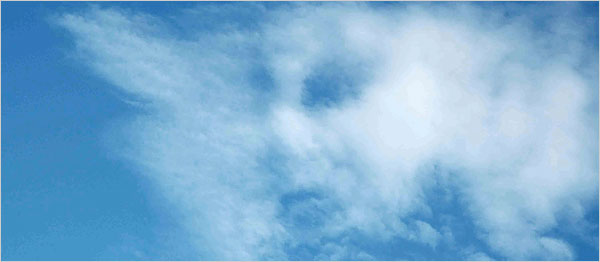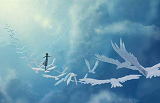

|
Your role in the world is to create, and your creative force comes from an intuitive connection that is larger than you are. Care for yourself in a way that helps to preserve and to clarify that connection. Tap into the messages that drive your creativity, and allow them to guide your life. — Josh Mitteldorf |
1 February 2015
|
|
Headline body ‘’ “” — Author |
2 March 2015
|
|
The Long-term Future I believe that life can go on forever. It takes a million years to evolve a new species, ten million for a new genus, one hundred million for a class, a billion for a phylum—and that’s usually as far as your imagination goes. In a billion years, it seems, intelligent life might be as different from humans as humans are from insects. But what would happen in another ten billion years? It’s utterly impossible to conceive of ourselves changing as drastically as that, over and over again. All you can say is, on that kind of time scale the material form that life would take is completely open. To change from a human being to a cloud may seem a big order, but it’s the kind of change you’d expect over billions of years. — Freeman Dyson |
3 February 2015
|
|
It is easier to live through someone else than to become complete yourself. — Betty Friedan, born this day in 1921 |
4 February 2015
|
|
Mendelssohn’s tribute to Bach Mendelssohn set to music Bach’s German translation from the Latin, “Wer nur den lieben Gott läßt walten” |
5 February 2015
|
|
Why you should believe in Reincarnation Our birth is but a sleep and a forgetting: If I was you, I would believe that. For then the great fairy Science, who is likely to be queen of all the fairies for many a year to come, can only do you good, and never do you harm; and instead of fancying, with some people, that your body makes your soul, as if a steam-engine could make its own coke; or, with some people, that your soul has nothing to do with your body, but is only stuck into it like a pin into a pin-cushion, to fall out with the first shake;—you will believe the one true, orthodox, inductive, rational, deductive, philosophical, seductive, logical, productive, irrefragable, salutary, nominalistic, comfortable, realistic, and on-all-accounts-to-be-received, doctrine of this wonderful fairy tale; which is, that your soul makes your body, just as a snail makes his shell. For the rest, it is enough for us to be sure that whether or not we lived before, we shall live again. * William Wordsworth, from Intimations of Immortality from Recollections of Early Childhood |
6 February 2015
|
|
It is when our budding hopes are nipped beyond recovery by some rough wind, that we are the most disposed to picture to ourselves what flowers they might have borne, if they had flourished. — Charles Dickens, born this day in 1812 |
7 February 2015
|
|
No words The Dao that can be described is not the true Dao. Again and again, we return, looking for the words that will liberate us. Perhaps we have only to get sufficiently jaded and disillusioned to shut off the spigot. Paul Dirac’s attempts in the 1930s to combine quantum mechanics with relativity led him to a model of reality, well-accepted by today’s physicists, in which the vacuum is teeming with virtual particles, flashing in and out of existence, occasionally staying around long enough to leave their mark on the world. When we sit in silence and drain the mind of thought, free of goals and expectations, we may discover that the emptiness of the moment is exploding with an unendurable barrage of sensations. It is absurd to imagine that only in death can we know the true nature of life. When we are dead, we know exactly nothing. But there are well-documented mysteries of people who suffer damage to some portion of the brain, and as a result some prodigious mental ability is uncovered, Jill Bolte Taylor tells the story of losing half her brain and gaining cosmic consciousness. — Josh Mitteldorf |
8 February 2015
|
|
Quantum and Consciousness Consciousness is the strangest thing to come out of biology. ‘The collapse of the wave function by observation’ is the strangest thing to come out of quantum physics. Could the too strange things be different ways of looking at one strange thing? Since the Dancing Wuli Masters of the 1970s, this has been an intriguing possibility, and since a 1994 book by physicist Roger Penrose, it has been a scientific hypothesis. But skeptics have predominated and actual evidence of a connection has been slow to be gathered. Now we have the first evidence linking brain workings to quantum coherence. Just a vague hint that encourages further research on this idea. |
9 February 2015
|
|
More evidence that fossil fuels are losing out to renewables
The log scales on this graph make you look twice. The graph is telling us that solar energy is 50 times cheaper than it was in 1976, and the amount of installed photovoltaic power is 50,000 times higher now than it was then. Solar energy has already won the race to be the cheapest energy source. All that remains is for a lethargic economy to catch up with the reality. — read more at Mother Jones |
10 February 2015
|
|
Twilight Music Know you the low pervading breeze — George Meredith, born this day in 1828 |
12 February 2015
|
|
The major danger of technology is not that we may play God, but that we may refuse to work at being fully human. — Michael Fossel |
13 February 2015
|
|
Free love? Free love? As if love is anything but free! Man has bought brains, but all the millions in the world have failed to buy love. Man has subdued bodies, but all the power on earth has been unable to subdue love. Man has conquered whole nations, but all his armies could not conquer love. Man has chained and fettered the spirit, but he has been utterly helpless before love. High on a throne, with all the splendor and pomp his gold can command, man is yet poor and desolate, if love passes him by. And if it stays, the poorest hovel is radiant with warmth, with life and color. Thus love has the magic power to make of a beggar a king. Yes, love is free; it can dwell in no other atmosphere. In freedom it gives itself unreservedly, abundantly, completely. All the laws on the statutes, all the courts in the universe, cannot tear it from the soil, once love has taken root. — Emma Goldman |
14 February 2015
|
|
Economic democracy There are but two political philosophies, being elitism and egalitarianism. In the abstract, they both sound reasonable. It’s obvious (say the elitists) that some have more to contribute to human exaltation than others, and those with more potential to offer great achievements should be afforded more resource, more freedom, and even some dominion in directing the activites of the others toward an end that may lift us all. No (say the egalitarians), we will get nowhere by quibbling over who is better and more deserving than who. Let us come together as equals and share equally the fruits of our cooperation. From here, it gets curiouser. We might think that the mediocre among us would be arguing for equality, while great minds appeal to be recognized with a greater share of the commonwealth. But not so! Almost all the great minds of history have been democrats. The exceptions that come to mind are Plato and Nietzsche. Those who have argued for special privileges have almost universally been scoundrels, megalomaniacs and sociopaths. The arc of human history has been away from slavery, feudalism, and totalitarian rule, toward economic freedom and political democracy. The last 30 years, however seems to be a retrenchment toward less freedom and less democracy. It is not working. Even the people at the top who benefit from the inequality are desperate and miserable. A transformative time is coming, and we shall birth a more beautiful world. — Josh Mitteldorf |
15 February 2015
|
|
His time and ours At what point then is the approach of danger to be expected? I answer, if it ever reach us, it must spring up amongst us. It cannot come from abroad. If destruction be our lot, we must ourselves be its author and finisher. As a nation of freemen, we must live through all time, or die by suicide. — Abraham Lincoln The dogmas of the quiet past, are inadequate to the stormy present. The occasion is piled high with difficulty, and we must rise -- with the occasion. As our case is new, so we must think anew, and act anew. We must disentrall ourselves, and then we shall save our country. |
16 February 2015
|
|
Soulful cello Listen to the lyric suite of Leevi Madetoja, Finnish composer born this day in 1887. Eeva Rysä (Cello), Jouko Laivuori (Piano) |
17 February 2015
|
|
If you lived in your heart, you’d be home now. — bumper sticker |
18 February 2015
|
|
The Verb, ‘To Be’ Je connais le désespoir dans ses grandes lignes. Le désespoir n’a pas d’ailes, il ne se tient pas nécessairement à une table desservie sur une terrasse, le soir, au bord de la mer. — André Breton, born this day in 1896 I know despair in the broad lines of the world. Despair has no wings; it does not deserve a seat at the terrace table where we sit of a summer evening, looking out on the sea. — loose translation by JJM. A more standard translation is here |
19 February 2015
|
|
The Winter of Listening No one but me by the fire, my hands burning red in the palms while the night wind carries everything away outside. All this petty worry while the great cloak of the sky grows dark and intense round every living thing. What is precious inside us does not care to be known by the mind in ways that diminish its presence. What we strive for in perfection is not what turns us into the lit angel we desire, what disturbs and then nourishes has everything we need. What we hate in ourselves is what we cannot know in ourselves but what is true to the pattern does not need to be explained. Inside everyone is a great shout of joy waiting to be born. Even with the summer so far off I feel it grown in me now and ready to arrive in the world. All those years listening to those who had nothing to say. All those years forgetting how everything has its own voice to make itself heard. All those years forgetting how easily you can belong to everything simply by listening. And the slow difficulty of remembering how everything is born from an opposite and miraculous otherness. Silence and winter has led me to that otherness. So let this winter of listening be enough for the new life I must call my own. — David Whyte |
20 February 2015 |
|
We shouldn’t have to put up with it, and if we come together we can change it. The state of the world today is upside-down. The wrong people are in jail, and the wrong people are out of jail. The wrong people are in power, and the wrong people are out of power. The wealth of the world and of this country is distributed in such a way as to require not just a small reform, but a drastic re-allocation. If you spend your time watching TV or reading scholarly works, you can begin to think that things are not so bad, that just little things are wrong that we can fix with democracy, with appeals to fairness. As soon as you say “civil disobedience”, we understand, “the problem is civil disobedience.” But this, too, is tospy-turvey. It’s upside-down. The problem is civil obedience. Our problem is the numbers of people all over the world who have obeyed the dictates of their government, and have gone to war. Millions have been killed because of this obedience. We easily recognize this in the case of Hitler’s Germany. People should not have obeyed. They should have resisted. And if we had been there, we are sure we would have done the right thing. We, in America, are grateful to have the rule of law. But the rule of law has regularized and legitimized the injustices that existed before the rule of law. That is what the rule of law has done. In all the nations of the world, the rule of law is the darling of the leaders and the plague of the people. What we are really trying to do is to get back to the spirit and aims of the Declaration of Independence. This spirit is resistance to illegitimate authority, and to forces that deprive people of their lives, their liberty, and a chance for a decent and productive livelihood. Politics is arranged to preserve the status quo, no matter who wins the election. To achieve justice, fairness and decency, we are going to have to go outside politics, outside the law. What we need is a new Declaration of Interdependence for people of all countries of the world. — listen to the words of Howard Zinn (1970) |
21 February 2015
|
|
Prayer Lead us from comfort to that uncomfortable edge of our abilities. Lead us from complacency to that uncomfortable edge of our imagination. Lead us from fear to that most uncomfortable edge of our courage. — Josh Mitteldorf |
22 February 2015
|
|
Handel doing sublime Listen to Kathleen Battle singing Ombra mai fu, aria from the opera Serse (or Xerxes). I also like Anne-Sophie von Otter’s version. Frondi tenere e belle del mio platano amato per voi risplenda il fato. Tuoni, lampi, e procelle non v'oltraggino mai la cara pace, né giunga a profanarvi austro rapace. Ombra mai fu di vegetabile, cara ed amabile, soave più. Tender and beautiful fronds of my beloved plane tree, let Fate smile upon you. May thunder, lightning, and storms never disturb your dear peace, nor may you by blowing winds be profaned. Never was a shade of any plant dearer and more lovely, or more sweet. — George Frederick Handel was born this day in 1685. |
23 February 2015
|
|
Puerta y Ventanas De nuestros miedos Doors and Windows From our fears our courages are born, |
24 February 2015
|
|
Leap of Faith When you want to lay yourself open for the divine, like a snare that is hollowed out to its depth, like a canopy that projects a shadow from the divine heat and light into your soul, then go into your inner place physically, or to that story or symbol that reminds you of the sacred. Close the door of your awareness to the public person you think yourself to be. Pray to the parent of creation, with your inner sense, the outer senses turned within. Veiling yourself, the mystery may be unveiled through you. By opening yourself to the flow of the sacred, somewhere, resounding in some inner form, the swell of the divine ocean can move through you. The breathing life of all reveals itself in the way you live your life. |
25 February 2015
|
|
Trust your wings Soyez comme l’oiseau, posé pour un instant — Victor Hugo, né cette journée en 1802 “Be like the bird that, pausing in her flight |
26 February 2015
|
|
Not for the fruits of our labor You have the right to work, but for the work’s sake only...Desire for the fruits of work must never be your motive in working. Never give way to laziness, either…Be even-tempered in success and failure; for it is this evenness of temper which is meant by yoga…They who work selfishly for results are miserable. — Lord Krishna, quoted by Enid Kassner |
27 February 2015
|
|
Mites Mites are specialists that occupy every conceivable niche, including the trachea of bees, the shafts of feathers, the anuses of turtles, the stink glands of bugs, the digestive systems of sea urchins, the lungs of snakes, the fat of pigeons, the eyeballs of fruit bats, the fur around vampire bat penises. If one can imagine a habitat, however narrow, mites are there, even if that habitat is hard to reach on legs just microns long and a tenth the thickness of a human hair. The habitats that offer mites the most advantages are bodies, whether of mammals, birds, insects, or any other creature larger than a mite. Bodies are the buffet bus of life, providing food and transportation. Mites that live on bodies are specially adapted to hold fast to their host, even when it runs, swims, or flies. But don’t worry. They’re not all over your hair and your face, crawling into pores during the day, mating on your skin at night, living on your ear wax and bellybutton lint. — Read moreat National Geographic |
28 February 2015
|























